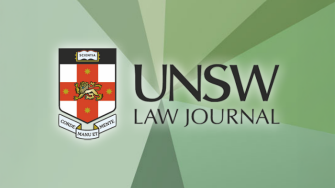Call for Submissions to the University of New South Wales Law Journal Issue 46(4)
‘Power, Workers and the Law’
‘Power, Workers and the Law’

The UNSW Law Journal is currently welcoming submissions for the thematic component of Issue 46(4), which is ‘Power, Workers and the Law’.
Australian workers’ collective power has dwindled over the past few decades. Union density in Australia decreased from 40% of employees to 14% from 1992 to 2020, despite workers facing increasing precarity due to factors including stagnating wages, job instability in casualised work, and the gig economy’s expansion. Workers and unions are regulated by an industrial relations legal regime which has been criticised by the International Labour Organization for falling short of international labour rights standards.
However, union activity has recently attracted media attention. Internationally, unionisation efforts at Amazon warehouses and Starbucks workplaces have been successful; while in New South Wales, public sector unions like the Rail, Tram and Bus Union, the Nurses and Midwives Association, and the Teachers Federation have taken disruptive industrial action in 2022. Furthermore, the Albanese Labor Government announced ‘immediate’ reforms to the Fair Work Act 2009 (Cth) (‘FW Act’)at its Jobs and Skills Summit in September 2022, including the introduction of multi-employer agreements and the modification of the Better Off Overall Test during enterprise bargaining.
In light of the recent surge of union activity and federal proposals to reform the FW Act, Issue 46(4) intends to publish submissions demonstrating a substantial connection to Australian labour, employment, and industrial relations law. While the Journal particularly encourages submissions examining collective labour law (eg, concerning trade unions, collective bargaining, industrial action), it also invites contributions which generally examine the law’s influence upon workers’ collective and individual power, agency, and vulnerability, as well as the future of work in Australia in light of increasing automation and gigification.
In writing submissions, authors may wish to explore the following issues. However, authors are not limited to these areas of law and are encouraged to draw upon their own areas of expertise.
Industrial Relations Law
Trade Union Regulation
Legal Profession and Industry
Criminalisation
Contract Law
Social Theory
The submission deadline for the thematic Issue 46(4) is 31 March 2023, with publication set for late November 2023. Any changes to these deadlines will be updated on the Journal’s website.
Submissions should be between 7,000 and 13,000 words in length, excluding footnotes. The style guide for the Journal is the fourth edition of the Australian Guide to Legal Citation, as supplemented by the latest edition of the Journal’s ‘Additions’, which is available on our website.
The Journal is an independent, peer-reviewed publication. While publication is subject to peer review, publication decisions remain at the Editor’s discretion, in counsel with the Executive Committee of the Journal. The Journal does not publish articles that have been, or will be, published elsewhere, either in identical or substantially similar form. Please contact the Journal at law.journal@unsw.edu.au if you are interested or have queries about submitting for Issue 46(4).
If you intend to submit an article, it would be greatly appreciated if you could please provide some early indication of your proposed topic or area of research. We strongly encourage you to pass this call for submissions to any colleagues, research networks or organisations who may be interested in making a submission.
Yours sincerely,
Anna Ho
Editor, Issue 46(4)